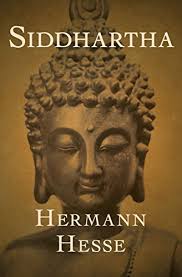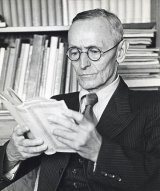Siddhartha Page #19
Siddhartha is a novel by Hermann Hesse that deals with the spiritual journey of self-discovery of a man named Siddhartha during the time of the Gautama Buddha. The book, Hesse's ninth novel, was written in German, in a simple, lyrical style.
Siddhartha straightened up, then he saw a person sitting opposite to him, an unknown man, a monk in a yellow robe with a shaven head, sitting in the position of pondering. He observed the man, who had neither hair on his head nor a beard, and he had not observed him for long when he recognised this monk as Govinda, the friend of his youth, Govinda who had taken his refuge with the exalted Buddha. Govinda had aged, he too, but still his face bore the same features, expressed zeal, faithfulness, searching, timidness. But when Govinda now, sensing his gaze, opened his eyes and looked at him, Siddhartha saw that Govinda did not recognise him. Govinda was happy to find him awake; apparently, he had been sitting here for a long time and been waiting for him to wake up, though he did not know him. "I have been sleeping," said Siddhartha. "However did you get here?" "You have been sleeping," answered Govinda. "It is not good to be sleeping in such places, where snakes often are and the animals of the forest have their paths. I, oh sir, am a follower of the exalted Gotama, the Buddha, the Sakyamuni, and have been on a pilgrimage together with several of us on this path, when I saw you lying and sleeping in a place where it is dangerous to sleep. Therefore, I sought to wake you up, oh sir, and since I saw that your sleep was very deep, I stayed behind from my group and sat with you. And then, so it seems, I have fallen asleep myself, I who wanted to guard your sleep. Badly, I have served you, tiredness has overwhelmed me. But now that you're awake, let me go to catch up with my brothers." "I thank you, Samana, for watching out over my sleep," spoke Siddhartha. "You're friendly, you followers of the exalted one. Now you may go then." "I'm going, sir. May you, sir, always be in good health." "I thank you, Samana." Govinda made the gesture of a salutation and said: "Farewell." "Farewell, Govinda," said Siddhartha. The monk stopped. "Permit me to ask, sir, from where do you know my name?" Now, Siddhartha smiled. "I know you, oh Govinda, from your father's hut, and from the school of the Brahmans, and from the offerings, and from our walk to the Samanas, and from that hour when you took your refuge with the exalted one in the grove Jetavana." "You're Siddhartha," Govinda exclaimed loudly. "Now, I'm recognising you, and don't comprehend any more how I couldn't recognise you right away. Be welcome, Siddhartha, my joy is great, to see you again." "It also gives me joy, to see you again. You've been the guard of my sleep, again I thank you for this, though I wouldn't have required any guard. Where are you going to, oh friend?" "I'm going nowhere. We monks are always travelling, whenever it is not the rainy season, we always move from one place to another, live according to the rules if the teachings passed on to us, accept alms, move on. It is always like this. But you, Siddhartha, where are you going to?" Quoth Siddhartha: "With me too, friend, it is as it is with you. I'm going nowhere. I'm just travelling. I'm on a pilgrimage." Govinda spoke: "You're saying: you're on a pilgrimage, and I believe in you. But, forgive me, oh Siddhartha, you do not look like a pilgrim. You're wearing a rich man's garments, you're wearing the shoes of a distinguished gentleman, and your hair, with the fragrance of perfume, is not a pilgrim's hair, not the hair of a Samana." "Right so, my dear, you have observed well, your keen eyes see everything. But I haven't said to you that I was a Samana. I said: I'm on a pilgrimage. And so it is: I'm on a pilgrimage." "You're on a pilgrimage," said Govinda. "But few would go on a pilgrimage in such clothes, few in such shoes, few with such hair. Never I have met such a pilgrim, being a pilgrim myself for many years." "I believe you, my dear Govinda. But now, today, you've met a pilgrim just like this, wearing such shoes, such a garment. Remember, my dear: Not eternal is the world of appearances, not eternal, anything but eternal are our garments and the style of our hair, and our hair and bodies themselves. I'm wearing a rich man's clothes, you've seen this quite right. I'm wearing them, because I have been a rich man, and I'm wearing my hair like the worldly and lustful people, for I have been one of them." "And now, Siddhartha, what are you now?" "I don't know it, I don't know it just like you. I'm travelling. I was a rich man and am no rich man any more, and what I'll be tomorrow, I don't know." "You've lost your riches?" "I've lost them or they me. They somehow happened to slip away from me. The wheel of physical manifestations is turning quickly, Govinda. Where is Siddhartha the Brahman? Where is Siddhartha the Samana? Where is Siddhartha the rich man? Non-eternal things change quickly, Govinda, you know it." Govinda looked at the friend of his youth for a long time, with doubt in his eyes. After that, he gave him the salutation which one would use on a gentleman and went on his way. With a smiling face, Siddhartha watched him leave, he loved him still, this faithful man, this fearful man. And how could he not have loved everybody and everything in this moment, in the glorious hour after his wonderful sleep, filled with Om! The enchantment, which had happened inside of him in his sleep and by means of the Om, was this very thing that he loved everything, that he was full of joyful love for everything he saw. And it was this very thing, so it seemed to him now, which had been his sickness before, that he was not able to love anybody or anything. With a smiling face, Siddhartha watched the leaving monk. The sleep had strengthened him much, but hunger gave him much pain, for by now he had not eaten for two days, and the times were long past when he had been tough against hunger. With sadness, and yet also with a smile, he thought of that time. In those days, so he remembered, he had boasted of three things to Kamala, had been able to do three noble and undefeatable feats: fasting--waiting--thinking. These had been his possession, his power and strength, his solid staff; in the busy, laborious years of his youth, he had learned these three feats, nothing else. And now, they had abandoned him, none of them was his any more, neither fasting, nor waiting, nor thinking. For the most wretched things, he had given them up, for what fades most quickly, for sensual lust, for the good life, for riches! His life had indeed been strange. And now, so it seemed, now he had really become a childlike person. Siddhartha thought about his situation. Thinking was hard on him, he did not really feel like it, but he forced himself. Now, he thought, since all these most easily perishing things have slipped from me again, now I'm standing here under the sun again just as I have been standing here a little child, nothing is mine, I have no abilities, there is nothing I could bring about, I have learned nothing. How wondrous is this! Now, that I'm no longer young, that my hair is already half gray, that my strength is fading, now I'm starting again at the beginning and as a child! Again, he had to smile. Yes, his fate had been strange! Things were going downhill with him, and now he was again facing the world void and naked and stupid. But he could not feed sad about this, no, he even felt a great urge to laugh, to laugh about himself, to laugh about this strange, foolish world.
Translation
Translate and read this book in other languages:
Select another language:
- - Select -
- 简体中文 (Chinese - Simplified)
- 繁體中文 (Chinese - Traditional)
- Español (Spanish)
- Esperanto (Esperanto)
- 日本語 (Japanese)
- Português (Portuguese)
- Deutsch (German)
- العربية (Arabic)
- Français (French)
- Русский (Russian)
- ಕನ್ನಡ (Kannada)
- 한국어 (Korean)
- עברית (Hebrew)
- Gaeilge (Irish)
- Українська (Ukrainian)
- اردو (Urdu)
- Magyar (Hungarian)
- मानक हिन्दी (Hindi)
- Indonesia (Indonesian)
- Italiano (Italian)
- தமிழ் (Tamil)
- Türkçe (Turkish)
- తెలుగు (Telugu)
- ภาษาไทย (Thai)
- Tiếng Việt (Vietnamese)
- Čeština (Czech)
- Polski (Polish)
- Bahasa Indonesia (Indonesian)
- Românește (Romanian)
- Nederlands (Dutch)
- Ελληνικά (Greek)
- Latinum (Latin)
- Svenska (Swedish)
- Dansk (Danish)
- Suomi (Finnish)
- فارسی (Persian)
- ייִדיש (Yiddish)
- հայերեն (Armenian)
- Norsk (Norwegian)
- English (English)
Citation
Use the citation below to add this book to your bibliography:
Style:MLAChicagoAPA
"Siddhartha Books." Literature.com. STANDS4 LLC, 2024. Web. 24 Nov. 2024. <https://www.literature.com/book/siddhartha_24>.




Discuss this Siddhartha book with the community:
Report Comment
We're doing our best to make sure our content is useful, accurate and safe.
If by any chance you spot an inappropriate comment while navigating through our website please use this form to let us know, and we'll take care of it shortly.
Attachment
You need to be logged in to favorite.
Log In